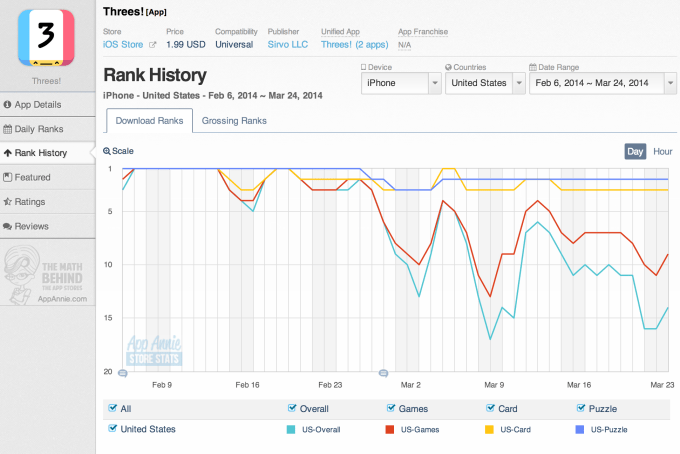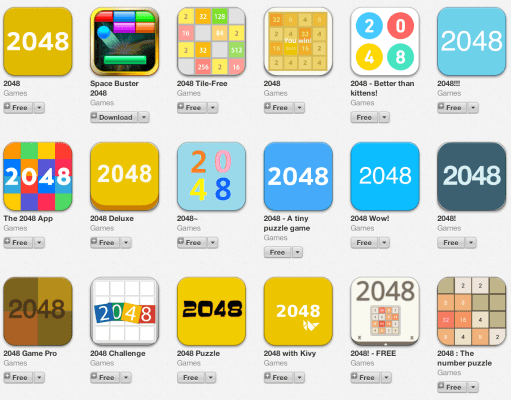Though the “Flappy Bird” craze may be winding down — currently, there’s only one “Flappy Bird” knock-off in the top 20 on the iTunes App Store — the longer-lasting effects of the viral game and all its many variations that followed, still continue to the point of ridiculousness. Case in point: the latest scourge in mobile app clones is that of a game called “2048,” a “clone of a clone of a clone,” which also has many clones itself.
This is starting to get a little nuts.
This latest clone battle, preparing to best the “Flappy Bird” saga, began with a well-designed, addictive puzzle app called “Threes” from development shop Sirvo (Greg Wohlwend and Asher Vollmer). The game launched in early 2014, and began to gain steam in February. Using Sudoku-like mechanics and Candy Crush-style matching, “Threes” involves matching up multiples of threes for higher scores.
 However, “Threes” was a paid game at $1.99, which meant there was room for another, perhaps less scrupulous developer, to come in and fill a gap by addressing a free-to-play audience. And so one did. “1024” quickly emerged, effectively ripping off “Threes,” even directly referencing the hit game it copied in its App Store description, saying: “No need to pay for ThreesGames. This is a simple and fun gift for you, and it’s free.”
However, “Threes” was a paid game at $1.99, which meant there was room for another, perhaps less scrupulous developer, to come in and fill a gap by addressing a free-to-play audience. And so one did. “1024” quickly emerged, effectively ripping off “Threes,” even directly referencing the hit game it copied in its App Store description, saying: “No need to pay for ThreesGames. This is a simple and fun gift for you, and it’s free.”
Soon, the battle of the “Threes” clones was on. Next came a game called “2048,” which launched online, also a copy of “Threes” and “1024.” Its creator explained he built the web app because his phone couldn’t run the iPhone and Android versions of the earlier titles, though he refused to detail the specifics surrounding how exactly his game came to be in an online FAQ which begins with not one, but two, questions asking if the game is, in fact, “just a ripoff.”
Yet another “2048” title soon followed, this time from 19-year-old Italian developer Gabriele Cirulli, who added animations to the online version, noting on Hacker News about the release that it was “a bit hard to play without them.” Cirulli said his attempt was meant to be a weekend project, and claimed he hadn’t even heard of the original “Threes” when he first came across “1024” in the App Store and the online variation “2048.”
However, Cirulli didn’t try to generate revenue from his game, telling The Wall St. Journal that he “didn’t consider it his own work” (though an earlier version allowed for donations). The article sets up Cirulli as something of an inheritor to the “Flappy Bird” throne, as he speaks of the guilt he feels when people complain of wasting time on his game. (“Flappy Bird” creator Dong Nguyen, if you’ll recall, famously admitted he felt “guilty” about the addictive nature of his game, which he cited as one of the reasons he took the game down from the iTunes App Store earlier this year.)
28000 people playing #2048game right now. The amount of man-hours spent playing this game will never be returned to humanity.
— Gabriele Cirulli (@gabrielecirulli) March 12, 2014
Cirulli, though, didn’t feel too guilty — his code remains on GitHub where others can access, copy and customize it to their liking. Many have done so, building funny online clones, incorporating Tetris elements, Dr. Who, the doge meme, 3D, and, of course, Flappy Bird itself.
Meanwhile, the App Store “2048” clone launches continue. A search in the iTunes App Store today reveals just what this latest gold rush looks like: There are now over two-dozen variations of the “2048” game, as well as other games stuffing the term “2048” into their title or game’s description in hopes of being surfaced in the search results. There are also a few other “1024’s,” plus spin-offs involving 8’s or 5’s instead of 3’s or 2’s.
No. this is not an optical illusion #2048store pic.twitter.com/vOJJTiC6BQ
— Ouriel Ohayon (@OurielOhayon) March 23, 2014
For the makers of “Threes,” the good news is that the emergence of the clones hasn’t decimated its market share – the app is still a Top 10 title in Puzzle Games, Card Games and the general Games category in the U.S. and a top 20 Overall app on the U.S. App Store. (All Paid rankings, which, to be fair, is less competitive than the Free ranks.)

While the cutthroat mobile gaming industry has always been rife with cloning (often from larger companies like Zynga profiting from the work of smaller developers, or suing those that copy their own successes), the rise of these simplistic games, prompted by the “Flappy Bird” viral hit, means the rate at which other clones can be created and shipped has dramatically shortened.
We’ve even seen cases where nothing more than mobile gaming templates have shot up into the App Store’s Top Charts, for example.
The end result for both app stores, Apple’s iTunes and Google Play, is one where the Top Charts could easily become compromised, as the cloners are often the more unscrupulous types who manipulate rankings in their favor using tricks and loopholes to gain rank.
That raises the question: Should today’s app stores do more to promote the original game or let market forces dictate the top ranks as always? Should there be any attempt at curation, when one app tries to gain from the success of another? For what it’s worth, Apple and Google are already beginning to address this problem, to some extent, as they both rejected apps using “Flappy” in the title in recent weeks. Of course, these were not across-the-board rejections clearly.
For Apple and Google — the latter which is more heavily affected by clones thanks to a less cumbersome review process — this shift to rapid cloning means they’ll have to soon decide if they want to take a more solid position as to where they stand when it comes to these new titles and their quickly shipped variations. If not, the app stores may begin rewarding those who don’t build gaming companies focused on quality and lasting success, but rather quick make-a-buck gains.
